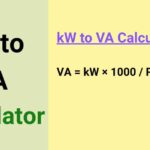Watts to kVA Calculator
Calculation Formula
kVA = Watts / (1000 × Power Factor)
Apparent Power (kVA)
When working with electrical systems, using the right Watts to kVA calculator is essential. I’ve personally used these tools to make quick and accurate conversions, and I can confidently say they save time and reduce errors.
This easy-to-use Watts to kVA calculator helps you convert watts to kVA in seconds, whether you’re at home or managing an industrial load.
Why You Need a Watts to kVA Calculator?
A Watts (W) to kilovolt-amps (kVA) calculator is useful for converting real power (P) in watts (W) divided by 1000 times power factor (PF) to find the apparent power in kVA.
If you’re working on electrical projects, you’ve likely needed to convert watts to kVA using a simple, efficient tool.
Having tried many calculators, this one truly stands out for its speed and ease of use. Just enter the watts and power factor values, and press the calculate button to get the result instantly.
Whether you’re dealing with small appliances or large motors, you can quickly find the power ratings without complex manual formulas.
Also Read: EV Calculator
How to Use the Watts to kVA Calculator?
Using the Watt to kVA calculator is simple:
- Enter real power in watts.
- Input the power factor.
- Click the calculate button to get the result.
This method directly uses the kVA to Watts Formula:
kVA = Watts ÷ (1000 × PF)
The kVA calculator helps you determine the apparent power in kilovolt-amps (kVA), which is crucial in sizing electrical equipment accurately.
Also Read: kVA to Amps Calculator
Example Calculations:
| Watts | Power Factor (PF) | Result in kVA |
|---|---|---|
| 1000 W | 0.8 | 1.25 kVA |
| 3000 W | 0.9 | 3.33 kVA |
| 5000 W | 0.85 | 5.88 kVA |
| 8000 W | 0.95 | 8.42 kVA |
| 10000 W | 0.9 | 11.11 kVA |
This makes it easier to convert 1000 watts to kVA, or check values like 3000 watts to kVA calculator or 5000 watts to kVA calculator without hassle.
Also Read: kW to kVA Calculator
Why This Calculator is the Best?
✅ It’s accurate for kVA conversion
✅ Quick and easy conversion from watts
✅ Ideal for power calculations in homes, industries, and engineering projects
✅ Works well for watt to kVA calculator needs like 5 kVA to watts calculator and 4000 watts to kVA calculator
I’ve found this tool extremely reliable when dealing with real power to apparent power conversions.
It helps ensure efficiency in electrical circuits and supports accurate measurement of power usage.
Also Read: Watt to kWh Calculator
FAQs
How many watts are in a kVA?
One kVA (kilovolt-ampere) is equal to 1,000 watts only if the power factor (PF) is 1.0. In real applications, the actual watts depend on the power factor.
How many kVA is 3500 watts?
To convert 3500 watts to kVA, divide by (1000 × power factor). For example, with a power factor of 0.8, 3500 W ÷ (1000 × 0.8) = 4.38 kVA.
What is 2000W in kVA?
2000 watts is 2.5 kVA if the power factor is 0.8, using the formula: kVA = Watts ÷ (1000 × PF). Always consider the power factor for accurate conversion.
Is 1 kVA 1000 watts?
1 kVA is not always 1000 watts. It equals 1000 watts only when the power factor is 1.0. In most real-world situations, the actual watts are less.
How many watts are in 1.5 ton AC?
A 1.5-ton air conditioner typically uses around 1500 to 2000 watts, depending on the model, energy efficiency, and power factor.
Final Thoughts
If you want to use a watts to kVA calculator, this is the best tool I’ve personally used in my electrical work.
Whether you’re managing power factor, measuring apparent power in kVA, or ensuring system efficiency, this calculator simplifies everything.
I recommend bookmarking this watts to kVA calculator for quick access whenever you need it.










